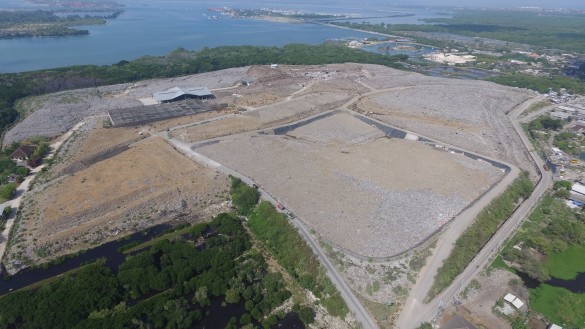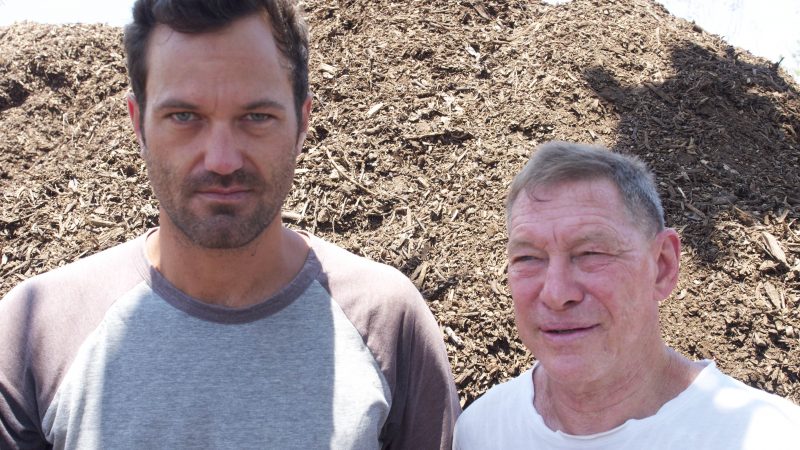Meet Rob and Olly of Bali Compost Crafters, two guys responsible for a project that has brought mechanized composting techniques to Bali for sustainable green waste management and regenerative agriculture.
Where are you originally from? Tell me about your background.
Rob – I’m a North American who has been practicing organic farming techniques for a large part of my life. Returning used green waste to the land for future crops is the foundation of this kind of work.
Olly – I’m an ex-corporate guy from New Zealand, a few years into a back-to-the-earth pursuit that I reckon many of my fellow countrymen can relate to.
How did you guys get together on this project?
Bali has been good to both of us. Poor waste management and unsustainable farming practices is something that’s going to tear the island’s guts out. We both wanted to give back, for the sweetness we have found here. We both recognize the urgency.
What inspired you to introduce a sustainable composting business here in Bali?
Bali has an undeniable garbage problem. The ‘they’ that people talk about – who should be doing something – don’t exist. There isn’t even anyone waiting to come to bat for this. It’s just too ominous. We are dreamers and fools, but believe it’s possible to promote a necessary change.
The government here has greater infrastructure problems to tackle and cannot spare the budget to address the causes and build solutions. We decided to set up a working example of management that could conceivably be implemented on a scale that could solve the problem, and pay its own way.
Are you working with any government agencies?
Our persistence paid off and we eventually stuck our elbows through the right door. We’re proud to have partnered with the [sanitation department] Dinas Kebersihan dan Pertamanan (DKP). These are the guys in the green trucks you see collecting green waste, garbage and some recycling.
Because the DKP is also responsible for landscaping public roadsides, parks and buildings, they’re collecting tonnes of pure green waste each day. We intercept these loads specifically, before they find their way into the dump. They understand that green waste has no place in a landfill, and even compost small amounts of it themselves. We are offering them a mechanized solution capable of dealing with a much greater volume of it.
How are you educating people about good composting?
We’re working directly with the Faculty of Agriculture and Technology at Udayana University to create and manage an applied green waste programme for students. We’re also supporting their green farming initiative through the Udayana Community Development Program to promote chemical-free, sustainable agriculture amongst small farm cooperatives.
The Jimbaran campus has anointed our production site “the Compost Laboratory” and plans over time to have on-site classroom facilities, test gardens, and more.
We also need to educate the local market. Often, what gardeners and farmers have come to know as compost, contains only a small amount of composted material. It’s a far cry from the 100 percent pure and organic compost that we craft. We work with farmers, horticulturalists, landscapers and nurseries so they can compare our living earth brew against the benefits provided by what was the norm.
How does your method of composting differ from other composting methods practiced in Bali?
The most obvious difference is in the volume and quality we can produce with our machinery, and knowledge of the values of compost material. This helps us produce consistently high levels of balanced nutrients. Composting is organizing materials involved to proper proportions to add balanced nutrients to soil which [can] support healthy cycles of production.
We tailor our compost for the sorts of challenging soil types that make up much of Bali. For example, to recondition old sawah where soil has been stripped of its riches over years of chemical abuse, we need […] chunkier organic material, rich in humus. Our compost and topsoil mixes possess all the properties of the rainforest floor. This sets them apart from what you might get from processing kitchen waste. Our forestry-grade mulcher (the only one on the island) and our fermentation methods allow us to utilize even more raw materials.
How does your project align itself with other clean-up campaigns around the island?
There are a number of concerned expats heading up different kinds of programmes to deal with Bali’s waste catastrophe.
Each has taken up the task from a unique philosophical angle. Whenever plausible, we integrate with these other approaches to help each of us attain maximum effect from our visions. It’s a multi faceted challenge addressed by pressing awareness that a real answer needs to be forthcoming. Every hand is important.
At the very least, we take some sort of perverse pride from being the ‘dirt guys’, a couple of bule grubbing around in the less savoury areas of Bali. We like that the real hands-on people are the agriculture staff and students from the university, the industrious government guys and Bali’s gardeners and farmers. These are the future-focused people that we get to build this thing with.
What are some of the other issues that you are confronted with?
Bali’s farmers have been saturated with subsidized chemical fertilizers for over 50 years. Plastic waste has been thrown over the shoulder for two generations.
We are producing an organic supplement of a quality that these farmers have never known. To facilitate necessary exposure of what this change can do for them is a very tricky game. It requires educating and inspiring a repeatedly duped society that produces much of Bali’s food and flowers.
As expats, we cannot just tell them how to act, we must patiently await the train of approval. The university is helping with that, through their work with educating a market that there is no other direct avenue to reaching.
The first step of managing waste is separation. This involves educating the next generation. Once the children understand this, we are just one generation away from waste being disposed of consciously, as to its final destination. Our particular model focuses on the value of green waste that is untainted by non-recyclable garbage. Until now, the focus has always circulated around how many rupiah a pemulung (recycling scavenger) can get for a piece of plastic. As average garbage can consist of over 70 percent totally recyclable green waste in Indonesia, we’re trying to turn eyes towards a completely different value that isn’t as immediately visible as a payoff.
Apart from farmers, who else shows interest in what you are doing?
Large hotels, villas, and other businesses that feed off of tourism are beginning to realize the value of saving Bali island from choking on its own waste. Their awareness is spilling over to their employees, who witness what happens as a result. This is close-to-home exposure that integrates into society’s chatter about what’s happening to their island.
Your future plans?
Right now the model is working, the local government and communities have embraced us and the experiment rolls on towards [what] our Earth is hoping ‘man’ will wake up to. We’re proud to be diverting thousands of tonnes of green waste per year before it reaches the ‘hole’ at a garbage dump, and we are grateful to our partners in government and academia for supporting us. But we’re still only able to scratch at the edge of a monumental pile. We see a greener Bali just ahead.
For more information, visit www.balicompostcrafters.com.




